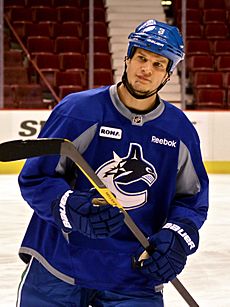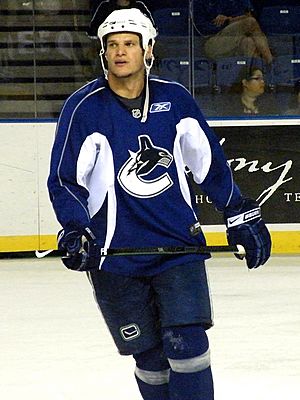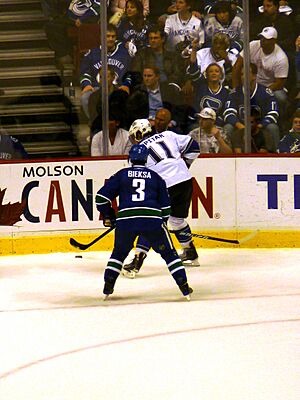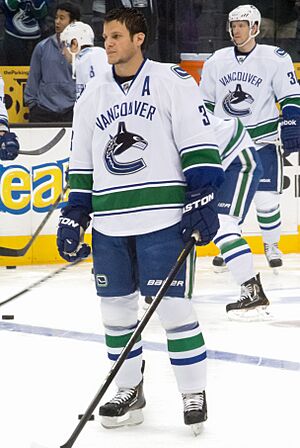Kevin Bieksa facts for kids
Quick facts for kids Kevin Bieksa |
|||
|---|---|---|---|

Bieksa with the Vancouver Canucks in March 2012
|
|||
| Born | June 16, 1981 Grimsby, Ontario, Canada |
||
| Height | 6 ft 1 in (185 cm) | ||
| Weight | 197 lb (89 kg; 14 st 1 lb) | ||
| Position | Defence | ||
| Shot | Right | ||
| Played for | Vancouver Canucks Anaheim Ducks |
||
| National team | |||
| NHL Draft | 151st overall, 2001 Vancouver Canucks |
||
| Playing career | 2004–2018 | ||
Kevin Francesco Bieksa (born June 16, 1981) is a Canadian former professional ice hockey player. He was a defenceman, which means he played a defensive role on the ice. Bieksa played most of his career with the Vancouver Canucks. He also played for the Anaheim Ducks.
Before joining the pros, Kevin played three years in the Ontario Junior Hockey League (OJHL). He then earned a scholarship to Bowling Green State University. He played four years for the Falcons. He even earned an award for his strong play. Kevin graduated with a degree in finance. He was also recognized for his good grades.
Kevin Bieksa represented Canada in the 2014 World Championship. He was chosen as the team captain. He was also named one of Canada's top three players in that tournament. He played for Canada again in the 2018 Spengler Cup. After retiring from playing, Bieksa became a co-host for Hockey Night in Canada.
The Canucks picked Kevin 151st overall in the 2001 NHL entry draft. After college, he joined their minor league team, the Manitoba Moose. This team is part of the American Hockey League (AHL). He was named to the AHL All-Rookie Team in his first full season. He then joined the Canucks as a regular player in the 2005–06 season. Kevin was known as a tough and skilled defenceman.
Contents
Kevin Bieksa's Hockey Journey
Early Years in Minor Hockey
Kevin Bieksa grew up in Grimsby, Ontario. He started playing minor hockey there. He later played for the Stoney Creek Warriors. He also played for the Burlington Cougars. In 1998, he was drafted by the Mississauga IceDogs. However, Kevin chose to go to college instead. He wanted to get an NCAA scholarship.
Junior and College Hockey
Bieksa played three years of Junior A hockey with the Burlington Cougars. This was in the Ontario Junior Hockey League (OJHL). In his second season, he scored 37 points. In his third season, he had 33 points. He decided to play college hockey instead of major junior hockey.
In the 2000–01 season, Bieksa joined the Bowling Green Falcons. They played in the Central Collegiate Hockey Association (CCHA). As a freshman, he scored 13 points in 35 games. He helped his team reach the CCHA semifinals.
The Vancouver Canucks drafted Bieksa in 2001. He was the 151st pick in the 2001 NHL entry draft. He went back to Bowling Green to finish his college career. In 2001–02, he scored 15 points. He was named an alternate captain in his third season. He then had a college career-high of 25 points. Fans chose him for the W. G. Grinder's Grinder Award. He also won the Jim Ruehl Award for best defensive player.
In his final college season (2003–04), he scored 22 points. He was recognized as one of the best players in the CCHA.
Starting Pro: The Manitoba Moose
After college, Bieksa joined the Manitoba Moose. This was the Canucks' minor league team in the American Hockey League (AHL). He signed a tryout contract on March 24, 2004. He played four games that season and had two assists.
He stayed with the Moose for the 2004–05 season. He scored his first professional goal on November 11, 2004. He finished the season with 12 goals and 39 points in 80 games. He was named the AHL Rookie of the Month for March. He also made the AHL All-Rookie Team. His 39 points set a new team record for a rookie defenceman.
During his time with the Moose, he got the nickname "Juice." This nickname stayed with him throughout his NHL career.
Bieksa hoped to join the Canucks in the 2005–06 season. However, he got a high ankle sprain during training camp. He missed the start of the season. He was named an alternate captain for the Moose while he was recovering. He returned to play on November 11.
Becoming a Canuck (2005–2015)
Kevin Bieksa was called up by the Canucks in December 2005. He played his first NHL game on December 19, 2005. He got his first NHL point, an assist, on January 5, 2006. He played 39 games for the Canucks that season.
On August 17, 2006, he signed a new contract with the Canucks. In the 2006–07 season, he scored his first NHL goal on October 13. He quickly became one of the Canucks' best defencemen. He led all team defencemen with 30 assists and 42 points. He also scored 12 goals. He was often paired with Willie Mitchell. They played against the other team's top players. At the end of the season, he won the Canucks' Babe Pratt Trophy as best defenceman. He also won the Fred J. Hume Award as the unsung hero. In his first NHL playoff game, he played over 55 minutes in a long overtime win. The Canucks were later eliminated by the Anaheim Ducks.
The Canucks signed Bieksa to a new three-year contract on July 9, 2007. His last name was often mispronounced by sports announcers.
In November 2007, Bieksa suffered a serious calf injury. An opponent's skate cut him during a game. He missed 47 games because of this. He returned to play 12 points in 34 games.
He continued to have injury problems in the 2008–09 season. He broke a bone in his left foot. Despite missing games, he had a career-high 32 assists and 43 points. This was the most among team defencemen.
Bieksa was often part of trade rumors. In December 2009, he suffered another serious leg cut. An opponent's skate cut his left leg above the ankle. He missed three-and-a-half months. He was limited to 55 games that season. He scored his first career playoff goal in the 2010 playoffs. The Canucks won that game. He finished the playoffs with eight points in 12 games.
In the 2010–11 season, Bieksa's scoring went down. However, his defensive play improved a lot. He was praised for being more responsible in his own zone. In February 2011, he broke another bone in his foot. He missed 15 games. He finished the season with a +32 plus-minus rating. This was his best ever. The Canucks won the Presidents' Trophy that year. They entered the 2011 playoffs as the top team.
In the playoffs, Bieksa helped the Canucks reach the Stanley Cup Final. This was their first time since 1994. In game two against the San Jose Sharks, he had a Gordie Howe hat trick. This means he scored a goal, had an assist, and got into a fight. He scored the winning goal in double-overtime in game 5 against the Sharks. This sent the Canucks to the Final. They faced the Boston Bruins and lost in seven games. Bieksa finished the playoffs with 10 points. His five goals led all defencemen in the playoffs.
After the season, Bieksa signed a new five-year, $23 million contract. This deal included a no-trade clause. He played 78 games in the 2011–12 season. He had eight goals and 36 assists for 44 points. The Canucks won the Presidents' Trophy again. However, they lost in the first round of the 2012 playoffs.
On December 22, 2013, Bieksa played his 500th NHL game. He finished the 2013–14 season with 24 points. The Canucks missed the playoffs that year.
In January 2015, Bieksa broke his hand. He missed 22 games. He returned in March. He finished the 2014–15 season with 14 points in 60 games. The Canucks returned to the playoffs. They lost in the first round to the Calgary Flames.
Joining the Anaheim Ducks (2015–2018)
On June 30, 2015, the Canucks traded Bieksa to the Anaheim Ducks. He reunited with his former teammate Ryan Kesler. Two days later, Bieksa signed a two-year contract with the Ducks. He had 15 points in 71 games in the 2015–16 season. The Ducks lost in the first round of the 2016 playoffs.
In the 2016–17 season, his second with the Ducks, Bieksa helped guide younger defencemen. He had 14 points in 81 games. In the 2017 playoffs, the Ducks swept the Calgary Flames. Bieksa had four assists in that series. He then injured his knee in the next round. He missed some games but returned for the conference finals. The Ducks lost to the Nashville Predators.
During the 2017–18 season, Bieksa did not score any goals. This was the first time since his rookie season. He had eight assists in 59 games. He played one game in the 2018 playoffs. The Ducks were swept by the San Jose Sharks.
Retirement from Playing
On October 13, 2022, the Canucks announced that Bieksa would sign a one-day contract. He officially retired on November 3, 2022. This happened when the Canucks played against the Ducks.
Kevin Bieksa's Playing Style
Bieksa was known as a "two-way defenceman." This means he was good at both defending and helping with offense. He often joined the attack. He led Canucks defencemen in scoring in 2006–07 and 2008–09.
He was a very physical and aggressive player. He earned a reputation as a fighter early in his career. He was known for a special "superman punch" move on skates. He was even listed as an undefeated fighter at one point.
Coaches and teammates praised Bieksa for his leadership. The Sedin twins, who were his teammates, called him a "great leader" and "great teammate."
Bieksa, along with Ryan Kesler, Alexandre Burrows, and Maxim Lapierre, were known as fierce competitors. They were a big reason for the Canucks' success in 2011. They were known as some of the toughest players to play against.
Life After Hockey
In 2019, Kevin Bieksa helped start West Coast Academy. This is an ice hockey academy in Southern California.
In 2020, he joined Hockey Night in Canada as an analyst. He was nominated for Best Sports Analyst in 2021 and 2022. He won the award in 2024 at the 12th Canadian Screen Awards.
From 2019 to 2021, he was an assistant coach for the Anaheim Jr. Ducks. Since the 2021–22 season, he has been an assistant coach for the Fairmont Preparatory Academy Huskies.
Bieksa also joined KO Sports, an ice hockey agency. He helps mentor young defencemen there. His former teammate Ryan Kesler also joined to mentor forwards.
Personal Life
Kevin Bieksa was born in Grimsby, Ontario, on June 16, 1981. His parents are Al Bieksa and Angela Lombardo. He has two brothers, Marty and Bryan. He also has two stepsisters, Terri Lynn and Jennifer. His father coached his sons in minor hockey. Kevin graduated from Bowling Green State University in 2004. He earned a degree in finance.
Bieksa became close friends with his teammate Rick Rypien. Rick struggled with mental health challenges and passed away in August 2011. Kevin was one of the first teammates Rick talked to about his struggles. When Rick took a break from hockey, Kevin invited him to live with his family. Bieksa was involved in many events to honor Rick's memory. He helped create the Hockey Talks initiative. This program encourages people to talk about mental health.
Bieksa and his wife, Katie, have two children. They have a son and a daughter. The family lives in Newport Beach, California. Katie published a book in July 2017 called Newport Jane. The book was inspired by Kevin's trade to Anaheim.
Career Statistics
Regular Season and Playoffs
| Regular season | Playoffs | |||||||||||||
|---|---|---|---|---|---|---|---|---|---|---|---|---|---|---|
| Season | Team | League | GP | G | A | Pts | PIM | GP | G | A | Pts | PIM | ||
| 1997–98 | Burlington Cougars | OPJHL | 27 | 0 | 3 | 3 | 10 | — | — | — | — | — | ||
| 1998–99 | Burlington Cougars | OPJHL | 48 | 8 | 29 | 37 | 83 | — | — | — | — | — | ||
| 1999–00 | Burlington Cougars | OPJHL | 49 | 6 | 27 | 33 | 139 | — | — | — | — | — | ||
| 2000–01 | Bowling Green State University | CCHA | 35 | 4 | 9 | 13 | 90 | — | — | — | — | — | ||
| 2001–02 | Bowling Green State University | CCHA | 40 | 5 | 10 | 15 | 68 | — | — | — | — | — | ||
| 2002–03 | Bowling Green State University | CCHA | 34 | 8 | 17 | 25 | 92 | — | — | — | — | — | ||
| 2003–04 | Bowling Green State University | CCHA | 38 | 7 | 15 | 22 | 66 | — | — | — | — | — | ||
| 2003–04 | Manitoba Moose | AHL | 4 | 0 | 2 | 2 | 2 | — | — | — | — | — | ||
| 2004–05 | Manitoba Moose | AHL | 80 | 12 | 27 | 39 | 192 | 14 | 1 | 1 | 2 | 35 | ||
| 2005–06 | Manitoba Moose | AHL | 23 | 3 | 17 | 20 | 71 | 13 | 0 | 10 | 10 | 38 | ||
| 2005–06 | Vancouver Canucks | NHL | 39 | 0 | 6 | 6 | 77 | — | — | — | — | — | ||
| 2006–07 | Vancouver Canucks | NHL | 81 | 12 | 30 | 42 | 134 | 9 | 0 | 0 | 0 | 20 | ||
| 2007–08 | Manitoba Moose | AHL | 1 | 0 | 1 | 1 | 2 | — | — | — | — | — | ||
| 2007–08 | Vancouver Canucks | NHL | 34 | 2 | 10 | 12 | 90 | — | — | — | — | — | ||
| 2008–09 | Vancouver Canucks | NHL | 72 | 11 | 32 | 43 | 97 | 10 | 0 | 5 | 5 | 14 | ||
| 2009–10 | Vancouver Canucks | NHL | 55 | 3 | 19 | 22 | 85 | 12 | 3 | 5 | 8 | 14 | ||
| 2010–11 | Vancouver Canucks | NHL | 66 | 6 | 16 | 22 | 73 | 25 | 5 | 5 | 10 | 51 | ||
| 2011–12 | Vancouver Canucks | NHL | 78 | 8 | 36 | 44 | 94 | 5 | 1 | 0 | 1 | 6 | ||
| 2012–13 | Vancouver Canucks | NHL | 36 | 6 | 6 | 12 | 48 | 4 | 1 | 0 | 1 | 8 | ||
| 2013–14 | Vancouver Canucks | NHL | 76 | 4 | 20 | 24 | 104 | — | — | — | — | — | ||
| 2014–15 | Vancouver Canucks | NHL | 60 | 4 | 10 | 14 | 77 | 6 | 0 | 0 | 0 | 9 | ||
| 2015–16 | Anaheim Ducks | NHL | 71 | 4 | 11 | 15 | 99 | 6 | 0 | 1 | 1 | 2 | ||
| 2016–17 | Anaheim Ducks | NHL | 81 | 3 | 11 | 14 | 63 | 8 | 0 | 4 | 4 | 23 | ||
| 2017–18 | Anaheim Ducks | NHL | 59 | 0 | 8 | 8 | 83 | 1 | 0 | 0 | 0 | 0 | ||
| NHL totals | 808 | 63 | 215 | 278 | 1124 | 86 | 10 | 20 | 30 | 147 | ||||
International Play
| Year | Team | Event | Result | GP | G | A | Pts | PIM | |
|---|---|---|---|---|---|---|---|---|---|
| 2014 | Canada | WC | 5th | 8 | 2 | 2 | 4 | 4 | |
| Senior totals | 8 | 2 | 2 | 4 | 4 | ||||
Awards and Honours
Bowling Green Falcons Team Awards
| Award | Year(s) |
|---|---|
| W. G. Grinder's Grinder Award | 2003 |
| Jim Ruehl Award (co-recipient with Jordan Sigalet) | 2003 |
| Howard Brown Award | 2004 |
AHL Awards
| Award | Year(s) |
|---|---|
| AHL All-Rookie Team | 2005 |
Vancouver Canucks Team Awards
| Award | Year(s) |
|---|---|
| Babe Pratt Trophy (Best Defenceman) | 2007 |
| Fred J. Hume Award (Unsung Hero) | 2007 |
Canadian Screen Awards
| Award | Year | Category | Work | Result | Ref(s) |
|---|---|---|---|---|---|
| Canadian Screen Awards | 2021 | Best Sports Analyst | Hockey Night in Canada | Nominated | |
| 2022 | |||||
| 2024 | Won |
Records
- Manitoba Moose franchise record: Most points by a rookie defenceman – 39 in 2004–05 (He broke the previous record of 32 points set by Kirill Koltsov in 2003–04).
 | Claudette Colvin |
 | Myrlie Evers-Williams |
 | Alberta Odell Jones |




